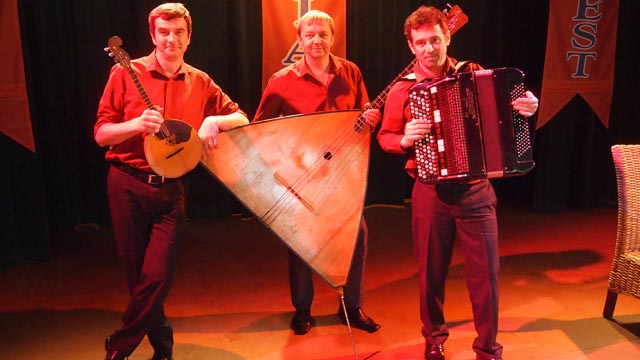Russian Folk Song
Kalinka
‘Kalinka’ is widely considered to be the most popular Russian folk song. It was written in 1860 by the composer and folklorist Ivan Laringov and first performed in Saratov, southeastern Russia, as part of a theatrical entertainment.
While the word ‘Kalinka’ literally translates as ‘little berry’, the song has been interpreted in sorts of ways. Some see it as a metaphor for the natural beauty of young women; others view it as a traditional love song. Catchy and vigorous, with a refrain that gets quicker with each repetition, it is often used in computer game, in particular Tetris, which, like the music, gradually speeds up to the point where it is pretty much unplayable.
Korobeiniki
Korobeiniki, in pre-revolutionary Russia, were peddlers with trays, who sold fabric, haberdashery and books amongst other things. In this 19th-century folk song, based on a poem of the same name by Nikolay Nekrasov, a peddler offers a peasant girl some of his wares in exchange for a kiss.
She rejects all but one: a turquoise ring, reasoning that having his wares but not him would be unbearable. The next morning, he pledges to marry her. Lively and propulsive, the music belies the poem’s sad ending: the peddler is robbed and killed by a forest ranger whom he asks for directions while returning home from the market.
Polyushka Polye
Composed in 1934 by Lev Knipper, an active agent of the state security service, this archetypal Soviet song is sung from the perspective of a Red Army recruit, who proudly leaves his home to keep watch against his homeland’s enemies.
Undeniably catchy, it was covered by many artists in the Soviet Union, including Poyushchiye Gitary (The Singing Guitars) - a rock band nicknamed ‘The Soviet Beatles’ thanks to their phenomenal popularity in the Soviet Union. Other memorable performers include Michael Palin, who sang it with the choir of the Russian Pacific Fleet as part of his television series: ’Full Circle with Michael Palin’. See below.
Ey, Ukhnem!
This song, known in English as the ‘Song of the Volga Boatman’, was sung by barge-haulers on the Volga River. A popular concert piece for bass singers, it has been reimagined by various composers, not least Stravinsky, who was asked by Sergei Diaghilev to orchestrate it for wind instruments, soon after the abdication of Tsar Nicholas II. There’s also Bill Finegan’s jazz arrangement of it for the Glenn Miller band, which reached Number one in the US charts in 1941.
Katyusha
With its militaristic subject matter - about a soldier protecting the Motherland while his grateful girlfriend Katyusha protects their love - this 1938 song by Mikhaïl Issakovski gained huge popularity during World War Two.
According to some, it inspired the name of the Soviet Union’s Katyusha rocket launchers, and it retained its popularity beyond the Fall of the Iron Curtain. In 2021 Russian athletes even proposed playing it at international sporting events in place of the Russian national anthem.
Dorogoï Dlinnoyou
This traditional Russian gypsy folk song, which translates as ‘On the long road’, is instantly recognisable in the UK, where it is better known by its English name: ‘Those Were the Days’. Composed in the 1920s in the Soviet Union, it found international success in 1962, thanks to the American group, The Limeliters. And in Russia it remains ever popular, thanks to its catchy melody and irrepressible energy.
Alyosha
This Soviet-era song, by Eduard Kolmanovsky, is named after the Alyosha Monument, a statue of a World War II Soviet Soldier in the Bulgarian city of Plovdiv, which pays tribute to the Soviet soldiers who died during fighting in Bulgaria. Slow and elegiac, it is a symbol of collective Russian memory.
Podmoskovyne Vechera
Translating as ‘Moscow Nights’, this plaintive Russian song is one of the best known abroad. It was written by composer Vasily Solovyov-Sedoi in 1955 with the title ‘Leningrad Nights’, but was later renamed at the request of the Soviet Ministry of Culture. Hugely popular in the USSR, it really gained a foothold abroad when the American pianist Van Cliburn played it to welcome Mikhail Gorbachev to the White House in 1989, turning it into a symbol of improving Russian-American relations.
Oi Moroz, Moroz
A popular drinking song, 'Oi Moroz, Moroz', which translates as ‘Oh, Frost, Frost’, is sung from the perspective of a man begging the winter cold not to freeze him and his horse while they are on the road because his beautiful and ‘jealous’ wife is waiting for him at home. As well as being a meditation on the Russian climate, it has been interpreted as a song about loneliness.
Hits: 1229
